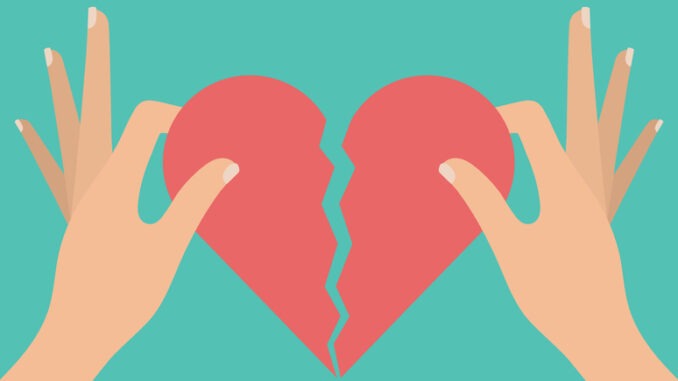
Breakups can be difficult for everyone – but is it possible that moving on isn’t as easy for you as it is for others?
CREDIT: This is an edited version of an article that originally appeared on happiful
Many people take a long time to heal after a breakup – and research suggests that the average American adult will experience three major relationship breakups during their lifetime.
Each one takes around six months to get fully over; however, we only give ourselves four days! For a long-term relationship (for example, a marriage) research shows it can take up to 18 months to move on.
So, why are some of us more affected than others? And could taking longer to ‘get over’ your ex be a sign of something more serious?
Relationship breakups: what’s ‘normal’?
There’s no ‘right’ or ‘wrong’ way to experience a breakup but there are aspects which can make it easier. You may feel more ready to move on if:
- Breaking up face-to-face – ghosting, or being rejected by text, call, or email, can prevent you both from fully expressing your feelings and being honest with each other.
- A clean break – when one partner tries to hang on, to ‘fix’ or ‘save’ things, it can cause more harm than good.
- Avoiding blame – in any relationship nobody is perfect, and pointing fingers will only create feelings of resentment and anger.
- Time to grieve – take the time to fully-process what has happened and what you have lost. Even if things have ended amicably, or you have drifted apart, there could still be a lot of things to process.
Breakup depression?
This is when feelings of sadness post-breakup, continue and start to affect your day-to-day life. A 2019 study concluded that post-breakup, our emotional state can closely resemble clinical depression. Breakup depression is where these negative feelings last longer than six months and affect other areas of your life. Symptoms can include:
- Feelings of apathy, helplessness or worthlessness.
- Changes in weight or appetite.
- Fatigue or lack of energy.
- Trouble sleeping.
- Loss of interest in hobbies.
- Thoughts of self-harm or suicidal thoughts.
Speaking with your GP can be the first step towards being assessed for depression (and other mental health concerns) and getting help and support.
Causes of breakup depression?
Breakup depression is triggered by big life events, such as the end of a relationship. If you already had low self-esteem, a breakup could affect how you see and value yourself. If you have low self-confidence, you may not trust your judgement, or feel comfortable, which makes you feel more insecure.
Speaking with your GP is the first step if you are worried that your feelings of depression have not faded within six months. Speaking with someone can, for many, be very freeing and can help you to process any unresolved thoughts. An experienced, qualified counsellor or therapist can help you to better understand yourself and how you cope with problems.
Give yourself time to embrace your emotions, both positive and negative. Prioritise your health, with a sustainable self-care routine, enough sleep, whole food and exercise. This will help boost your mood and improve energy levels. Do your best to avoid thinking of only positive or negatives in your previous relationship – this can give you a skewed view and hinder your attempts to move on.


Be the first to comment